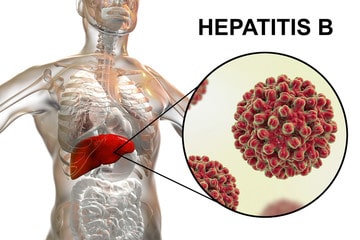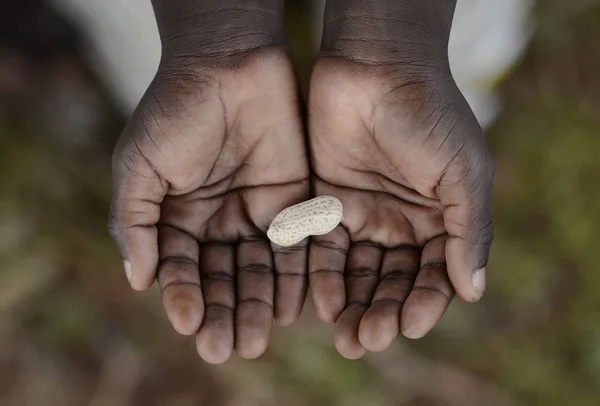Hepatitis B is a viral liver infection. It is the inflammation of the liver cells caused by the hepatitis B virus. The inflammation is not particularly caused by the virus itself but from the immune response of the body as it tries to eliminate the virus and recover from the infection. The infection could also progress on to other liver diseases like cirrhosis and hepatocellular carcinoma (liver cancer).
Hepatitis B can occur as an acute infection (when the infection occurs over a short period of time, and the individual might recover from) and chronic infection (when the infection persists and lasts for more than six months). Acute hepatitis B is more common in adults (60-85%) who are more likely to recover even after severe symptoms than in infants and children who more likely to develop chronic infection.
Hepatitis B Prevalence in Nigeria
A lot of Nigerians are at risk of this liver infection caused by the hepatitis B virus even though it is easily preventable by a vaccine. A study was done in 2014 on the Prevalence of hepatitis B virus infection in Nigeria, 2000-2013, by the Department of Medicine, Bayero University, Aminu Kano Teaching Hospital, Kano, Nigeria and the Department of Family and Community Medicine, Meharry Medical College, Nashville, Tennessee, USA. The study found out that a huge number of pregnant women and children in Nigeria were exposed to HBV from 2000 to 2013. It also reported that 7% of Nigerians have Hepatitis B.
Other reports on the prevalence of hepatitis B in Nigeria claim that they are an estimated 1.5 million cases per year. Another study in 2016 states that there’s low hepatitis B prevalence in Nigeria.

What are the common symptoms?
Although there are no symptoms in some people, especially children, the symptoms can be mild or very severe, and they include:
- Tiredness/ fatigue
- Loss of appetite
- Dark colour urine
- Nausea/vomiting
- Abdominal pain especially the part over the liver
- Pale colour stool
- Jaundice i.e., yellowing of the skin and the white part of the eye
In situations where the liver has been damaged, the symptoms can include:
- Increase in weight due to ascites
- Swelling in the abdomen and sometimes legs due to fluid accumulation
- Vomiting with blood in it
- Bleeding from the nose and mouth
- Persistent jaundice
- Hepatic encephalopathy i.e., mental disturbances and coma in an advanced stage
What is the mode of transmission?
Hepatitis B is known to be blood-borne as it is mainly transmitted from person to person by contaminated blood or other body fluids. It can also be transmitted from a pregnant mother to the unborn child during or after birth.
Who is at risk of contracting Hepatitis B?Some individuals have increased chances of contracting this infection more than others, and they include:
- Men and women who have unprotected sex
- People with HIV
- People who undergo dialysis of kidney disease
- People who pierce their skin using non-sterile techniques
- Individuals who inject drugs with shared needles
- Health workers who are in constant contact with contaminated needles and other sharp objects
- An infant born to infected mothers
- People in prisons
- People who travel to places where the disease is more common
How Can Hepatitis B be detected?
The virus can be detected through blood tests though sometimes physical examination of the patient may suggest the infection. The blood test is used to determine whether the infection is acute or chronic. These tests can determine the presence of the virus in the blood (antigen), the antibody against the virus, and the viral DNA.
During chronic infections, some other tests which are not blood tests needed to guide treatment may include:
- CT Scan
- Liver ultrasound
- Liver biopsy
The cost of Hepatitis B test in Nigeria ranges from ₦30,000 to ₦50,000. You can conduct the test in various hospitals in Nigeria.
Hepatitis B Treatment in Nigeria
There are no treatment options for acute infections as they tend to be resolved by the body. In cases of vomiting or diarrhea, prescriptions for restoring fluid are necessary.
Common hepatitis b drugs in Nigeria:
In chronic infections, antivirals like entecavir (Baraclude), tenofovir (Viread), lamivudine (Epivir), adefovir (Hepsera) and telbivudine (Tyzeka) — could be prescribed to slow down the multiplying of the virus to allow the liver to heal using liver function tests as a guide.
Although, hepatitis b medication does not work for every patient.
A liver transplant could be suggested in cases of liver damage.
Interferon injections are also used to treat hepatitis B. Interferon alfa-2b (Intron A) is an artificial version of a substance produced by the body to fight infection. It’s very expensive.
What are the possible outcomes of hepatitis B?
Hepatitis antigen (HBeAg) in the bloodstream is normally associated with complications if the disease progresses. They include:
- Liver cirrhosis (scarring of the liver)
- Liver failure
- Primary liver cancer
- Other medical conditions which may include kidney disease and blood vessel problems
Hepatitis Prevention Tips
A couple of things we can do to reduce the chances of infection include:
- Vaccination
- Safe sex for the sexually active
- Avoid sharing of needles or other sharp objects
- Health workers should follow standard precautions when working with needles and blood-related items
- Moderate use if alcohol
- Public health education and immunizarion against the virus are therefore advocated for adolescents born in the pre-hepatitis B vaccine era in the Nigeria.
Hepatitis B Vaccines in Nigeria
There’s a vaccine that offers lifetime protection from hepatitis B. The hepatitis B vaccine is a safe and effective for all. It is recommended for all infants at birth and for children down to the age of 18. The hepatitis B vaccine is also required for adults with diabetes and those at high risk for infection. This is among the Nigerian child vaccination schedule.
Keep in mind that babies born to infected mothers must get the first dose of hepatitis B vaccine within the first 12 hours of life. The Hepatitis B vaccine for new born and infants are Recombivax HB, and Engerix-B.
The common hepatitis B vaccine in Nigeria is Heplisav-B (Dynavax), a two-dose vaccine approved for use in adults aged 18 and older. The cost of hepatitis B vaccine in Nigeria ranges from ₦8,000 to ₦15,000.
Please consult your doctor to properly diagnosis, treatment and vaccination of hepatitis B.
You might also like to read…
- Complete List of Notifiable Diseases in Nigeria
-
Malaria in Nigeria: Symptoms, Prevention, Treatment, and Vaccine.
- 5 Common Diseases in Nigeria and How to Prevent Them
- Kwashiorkor: Symptoms, Causes and Treatments.
Collins Nwokolo is a human physiologist, writer and health enthusiast. He loves writing helpful articles on health and fitness, which he enjoys sharing with everyone.








